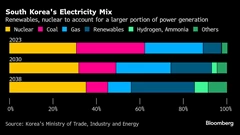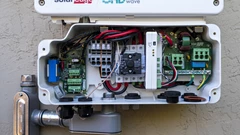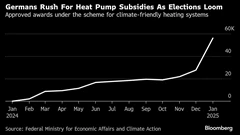Trump Orders Removal of EV-Favoring Policies and Subsidies
(Bloomberg) -- President Donald Trump ordered his administration to consider eliminating subsidies and other policies that favor electric vehicles, laying the groundwork for moves that risk slowing adoption of cleaner cars in the US.
The directive, included in a broad energy-focused executive order, contends that aid for EVs and other “ill-conceived government-imposed market distortions” effectively mandate their purchase. While the US lacks a hard-and-fast EV mandate at the federal level, recently imposed limits on vehicle tailpipe pollution compel carmakers to sell more electric models.
Trump stopped short of explicitly directing the Environmental Protection Agency to review or rewrite those rules, or for the Transportation Department to rework fuel-economy regulations that also were toughened under President Joe Biden.
The order does, however, specifically call for terminating waivers that allow states to limit gas-powered car sales, indicating that Trump will look to take on California again on those grounds. The state requires automakers to deliver increasing number of zero-emission vehicles every year through 2035, when all new cars sold will need to be zero-emission.
Trump also directed agencies to pause disbursement of funds appropriated through two laws Biden signed — the Inflation Reduction Act and Infrastructure Investment and Jobs Act — including funding for EV charging stations. The infrastructure law allocated $7.5 billion to building out a network of public plugs across the country.
Shares of EV makers fell Tuesday as the broader market rose. Tesla Inc. declined 4% as of 10:03 a.m. in New York, while Rivian Automotive Inc. slid 7.6% and Lucid Group Inc. was down 8.5%. Charging companies including EVgo Inc. and Blink Charging Co. also traded lower.
While Trump was president-elect, advisers recommended that he repeal federal policies that boost consumer demand for EVs, including the $7,500 federal tax credit for plug-in car purchasers, while still fostering a domestic supply chain to produce clean vehicles.
While it would take an act of Congress to fully rescind the consumer rebate, Trump has authority to expand limits on which companies are eligible to receive the rebates, and make other tweaks. A legally enduring rule could take months to complete.
(Updates with share trading in sixth paragraph.)
©2025 Bloomberg L.P.
KEEPING THE ENERGY INDUSTRY CONNECTED
Subscribe to our newsletter and get the best of Energy Connects directly to your inbox each week.
By subscribing, you agree to the processing of your personal data by dmg events as described in the Privacy Policy.
More renewables news

GB Energy Faces New Doubts as UK Declines to Affirm Future Funds

Korea Cancels Planned Reactor After Impeaching Pro-Nuke Leader

Brazil’s Net-Zero Transition Will Cost $6 Trillion by 2050, BNEF Says

SolarEdge Climbs 40% as Revenue Beat Prompts Short Covering

EU to Set Aside Funds to Protect Undersea Cables from Sabotage

China Revamps Power Market Rules In Challenge to Renewables Boom

KKR increases stake in Enilive with additional €587.5 million investment

TotalEnergies and Air Liquide partner to develop green hydrogen projects in the Netherlands

Germany Set to Scale Down Climate Ambitions
















